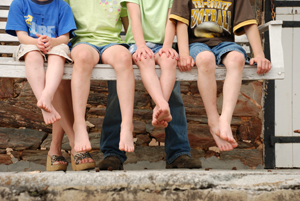Leg pain in children
Have your children been experiencing leg pain at night? If so, there are a number of causes that may be to blame for your children leg pain. Think carefully about the symptoms involved. Is the leg pain a constant pain, or is the leg pain intermittent? Does it occur at different times of the day, or does it occur only at night? Does the pain develop gradually, or does it develop all of a sudden? What part of your leg is affected? Is the pain coming in the knee area, shin area, ankle area, or thigh? Leg pain in children is also frequently described as “growing pains.” Although there is no scientific proof that the growth of bones causes pain, it is well known that children sometimes experience leg pain, often at night, for no obvious reason. These nonspecific types of pain are localized to the muscles and improve when the area is massaged, in contrast to chronic joint pain or true bone pain, which may worsen when the child is moved. Growing pains are believed to be a form of overuse injury or a response to the normal strains and stresses of active play. However, any child who is having disturbing episodes of pain should be evaluated to make sure there is not a disease or injury that is responsible for the symptoms.
Joint pain can be due to injury to the joint or to arthritis of the joint. In these cases, the pain may be accompanied by swelling, redness or warmth, and tenderness of the involved area. In very rare cases, benign or malignant tumors of bone or the surrounding soft tissues can cause leg pain. Leg pain in children can be a nonspecific response to everyday activities, often called “growing pains.” Other traumatic causes may produce more severe pain. Infections, inflammatory conditions, and, very rarely, tumors, are other causes of leg pain in children.

Leg pain in children may be felt in the muscles, particularly after a long day of play or an especially active day. These pains have been referred to as “growing pains” even though there is no scientific proof that growing bones cause any type of pain. In contrast to true bone pain or the pain associated with fractures or inflammatory conditions, nonspecific “growing pains” are usually relieved by rubbing or massaging the affected area.


No comments:
Post a Comment
Leave a comment if useful